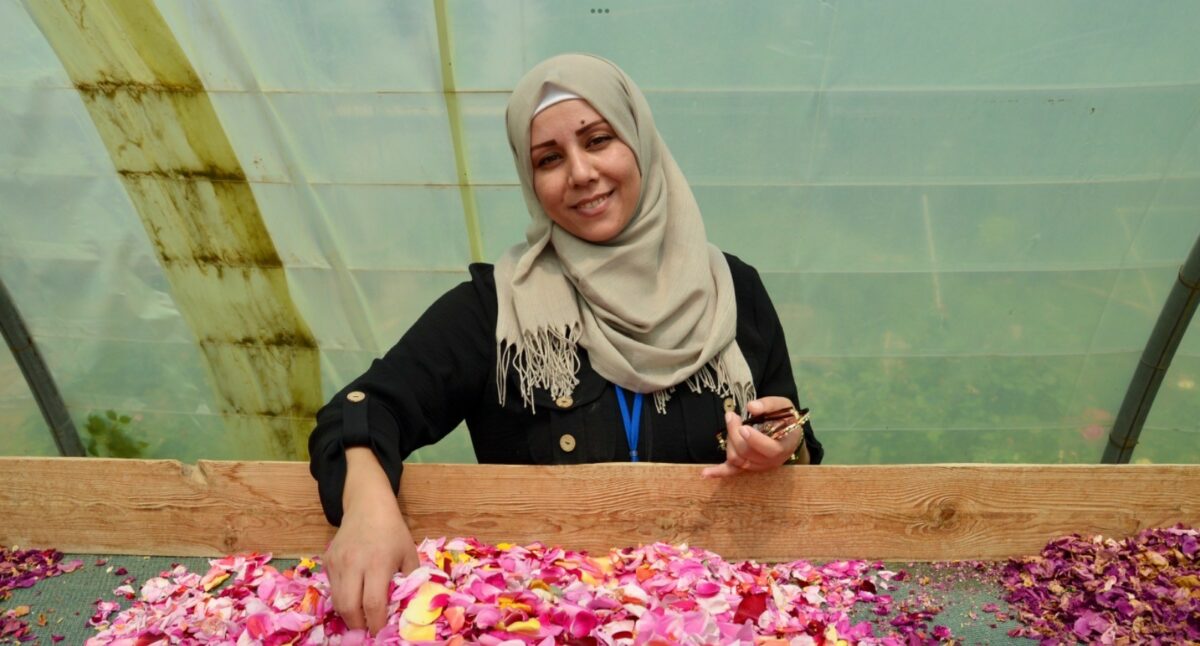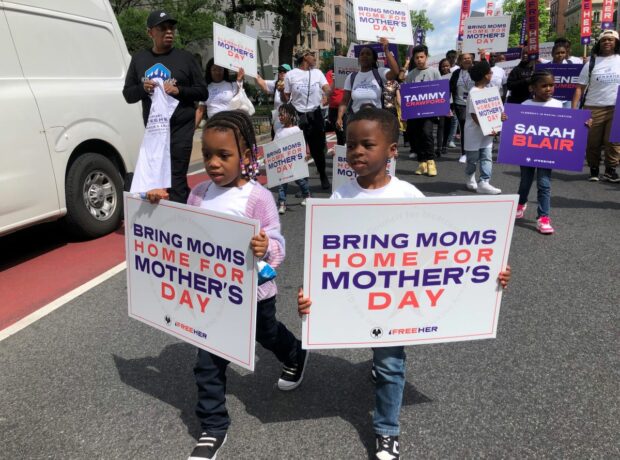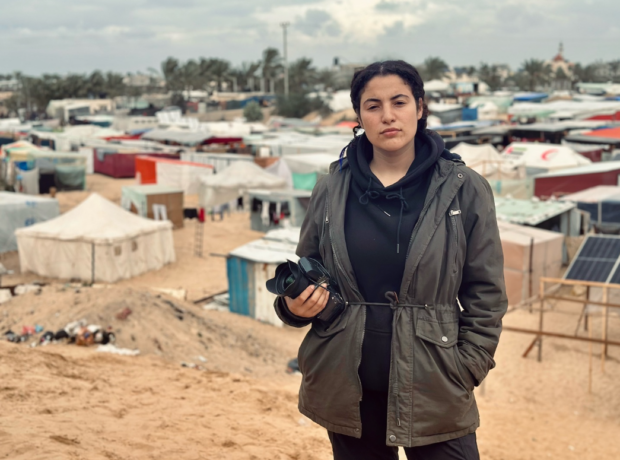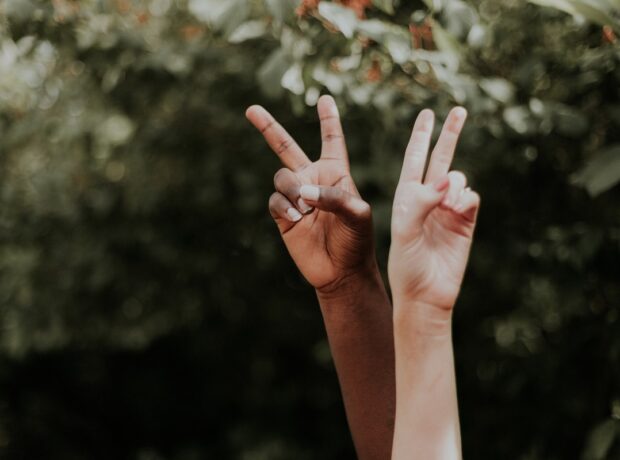When Aveen, a Syrian refugee and mother, found solace in gardening, she saw it as a way of putting down roots in her refugee camp in Kurdistan. How do families, like Aveen’s, find a sense of permanence while living long-term in temporary camps? Adam Robertson Charlton tells Aveen’s story.
Aveen Ibrahem runs her hands through the drying rose petals. It is late April in Iraqi Kurdistan, and the air inside the polytunnel is hot and fragrant.
The petals come from the damask rose, and Aveen explains that they will be mixed with lemon balm, rosemary, and mint to make herbal tea. Each ingredient is grown in the garden which surrounds the polytunnel.
Beyond the garden sprawls the largest refugee camp in Kurdistan. When the tea is ready, it is distributed among some of its 30,000 residents. The vast majority of these are Kurdish refugees from Syria, like Aveen and her family. Although her family came from an agricultural background, Aveen lived most of her life in the metropolitan environs of Damascus. In 2010, she was living with her husband and three children in Jdeidet Artouz al-Balad, an up-and-coming neighbourhood ten miles south of the city. It was a diverse and youthful place to live.
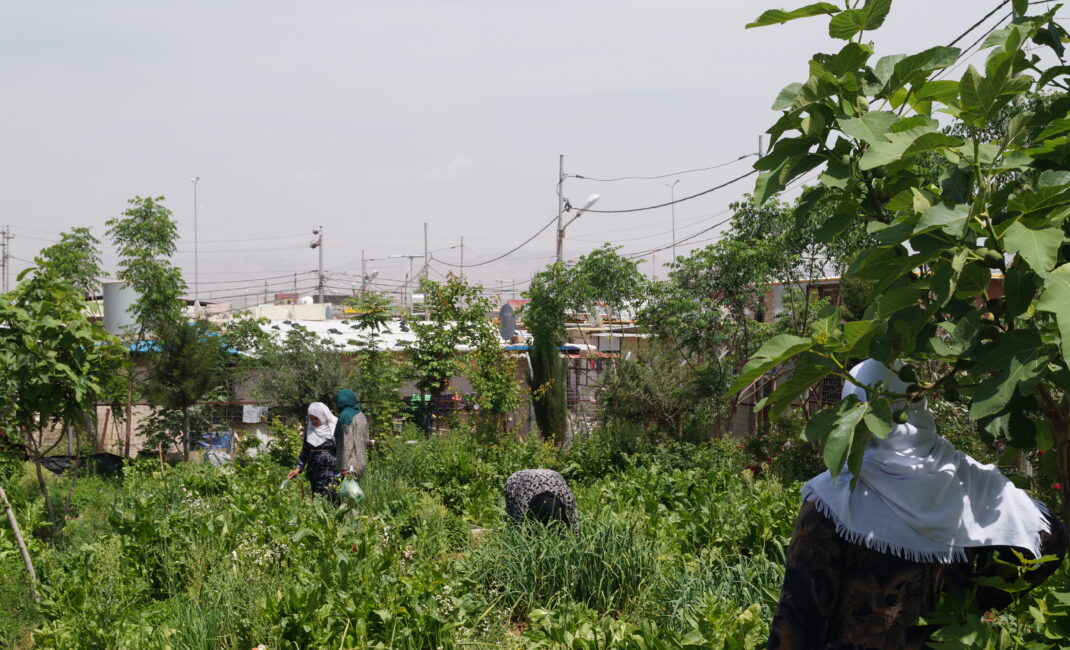
Aveen’s husband came from a lineage of masons, but chronic back pain had forced him to give up the family vocation. Instead, he found work as a security guard for a regional oil company. This paid well enough for Aveen to spend her time looking after their house, their children, and their garden.
Detached from the countryside in Jdeidet Artouz, Aveen and her family may not have felt the terrible drought that had wracked Syria since 2007. In nearby Jdeidet al-Fadel however, life had become cramped and competitive, as rural communities abandoned their dying fields for the city.
In early 2011, this pressure, compounded by a repressive government and growing unemployment, resulted in a wave of protests across Syria. When security forces tortured and executed a 13-year-old boy in Daraa, an hour-and-a-half south of Jdeidet Artouz, the protests became an uprising.
At first, the government of Bashir al-Assad would have considered Jdeidet Artouz a regime stronghold. The neighbourhood was popular with the Druze, Christians and Alawites, whose support had allowed the Assad dynasty to subordinate Syria’s Sunni Arab majority. Despite being the largest minority in Syria, the Kurds were never really part of this coalition. Kurdish was prohibited in schools, and the security forces were extremely active in Rojava, the Kurdish name for north-east Syria.
Some families in Jdeidet Artouz might have been comforted by the increased presence of blacked-out BMWs and military jeeps on their streets. But for Aveen and her family, it felt deeply ominous. In the twilight months of 2011, the fighting began to envelop Damascus. Regime forces were going door to door, looking for dissidents. Aveen watched alongside residents from Jdeidet Artouz as boys from the neighbourhood lined up in front of the local mosque. Among them were two of Aveen’s nephews. The security forces opened fire, killing them against a wall. Aveen and her husband now knew that staying was more dangerous than leaving. With their children and a few possessions, they abandoned their house and its garden and travelled 500 miles to Qamishli on the Turkish border.
THE JOURNEY
This journey took them from Syria’s southwest to its furthest northeast, but they could not outrun the war. When they arrived in Qamishli, winter was blowing off the Turkish uplands, and the security forces were digging in. In just eight months, the entire country had fallen apart. Having already left their home, it became evident that they must now flee Syria entirely. Crossing the Iraqi border was exhausting. As the war drew on, bus routes were established, and a bridge was built over the River Tigris. In the winter of 2011, the journey had to be taken on foot and by boat.
Aveen remembers, ‘going up and down over the hills and the rocks’, while she, ‘had to carry the bags’. The family walked for six hours over uneven, frozen ground before a perilous crossing on the swollen Tigris. ‘It was very hard’. Along with thousands of other Syrian Kurds, they disembarked in Iraq as refugees. From the banks of the Tigris, they were shuttled to Duhok in northern Iraqi Kurdistan, where a makeshift encampment was being built. This camp became known as Domiz One.
Aveen and her family had no idea that it would be their home for the next ten years. The first winter in the camp was defined by cold. Back then, it still snowed heavily in northern Iraq, and the wind would pour through their tent.
Pounded by gales and up to a foot of snow, ‘many of the tents collapsed because of the weight’. When the snow began to melt in the spring rains, ‘the mud would get to your knees’. With no electricity, it was impossible for Aveen and her husband to heat their tent. Both they and the children – two boys and a girl – had to rely on each other for warmth. These conditions could be lethal for adults, but children were at particular risk of disease in the freezing wet. Despite this, the family managed to survive their first year in exile. Around them, Domiz continued to grow. By the end of the second winter, the camp was home to 35,000 Syrian refugees.
LIFE IN THE CAMP
Many families were forced to share their tents with others, and the overcrowding led to outbreaks of hepatitis.
By April of 2013, almost one in ten children was suffering from diarrhoea. Sidra was Aveen’s eldest child and only daughter. As conditions in the camp deteriorated, so did her health. Sidra was suffering from a heart condition, but with just one health clinic per 12,000 refugees, it was impossible for Aveen to get her daughter the help that she needed.
Leaving was not an option. Back in Jdeidet Artouz, the killing was getting worse. That April, 28 patients were executed at point blank range when regime forces stormed a hospital in al-Fadel. Every day, almost a thousand new refugees were crossing the Tigris. Most of them came from Qamishli, where fighting had now erupted. A new camp, Domiz Two, was built to help with overcrowding, and the sea of tents continued to grow.
Within the woven plastic of her tent walls, Aveen felt hopeless; ‘unable to alleviate my daughters’ pain’. Aveen’s husband felt the same, compounded by his inability to work. In a corner of their makeshift home, Aveen began to garden. She started small at first, growing in pots and along the walls. It was ‘a simple garden, a few roses, a few climbing plants’. Over this little garden, Aveen had some agency. When her roses wilted and their petals turned yellow, she was able to revive them.
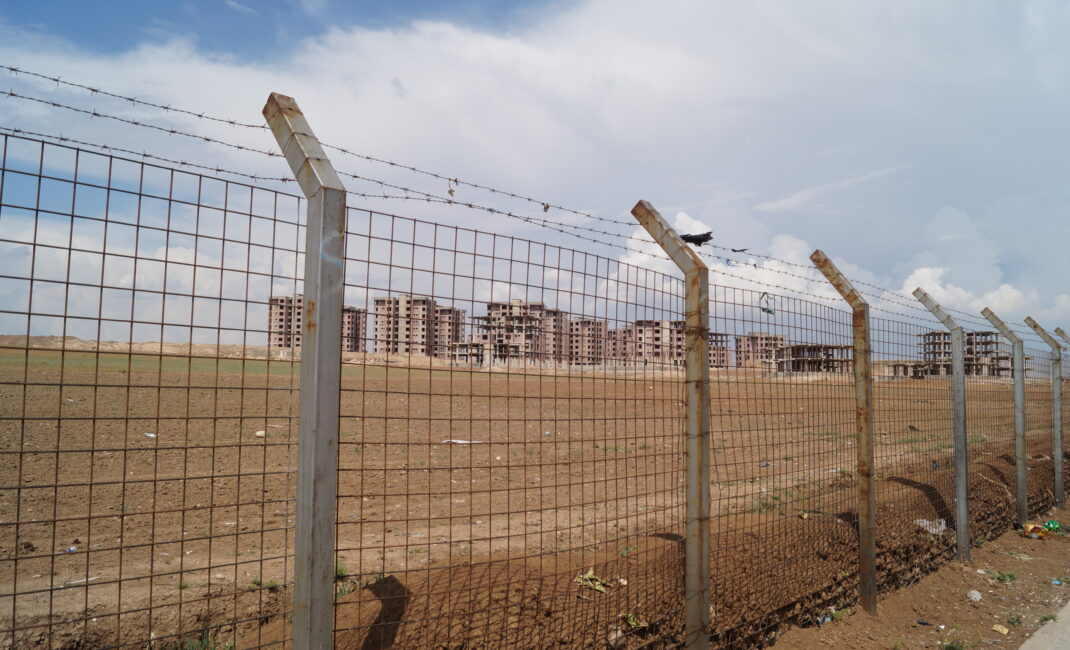
Security fence in Domiz
While too small to offer a physical escape, the garden became a psychological sanctuary for Aveen. Tending to her plants was a temporary relief from her family’s suffering, and the loss and disruption around her. Aveen was not alone. Throughout Domiz, plants were beginning to appear, growing ‘in pots, on walls, using recycled tools’. Between the plastic sheets and corrugated metal, the green tendrils of a vine would appear, thrusting towards the light.
Most of the camp residents came from an agricultural background, and growing was an integral part of their lives. Some did it for pragmatic reasons; to shield their tent from the sun, but just as many sought solace in gardening.
As Domiz entered its third year and the war in Syria continued to escalate, the realisation that the camp might be more than a temporary home was starting to set in.
One day, Aveen heard that a charity called the Lemon Tree Trust was giving out lemon trees in the camp. She went out and found a representative from the charity, who was busily distributing the saplings. Aveen grabbed him by the arm. ‘I have a garden!’, she said, ‘give me a tree’. She took the tree home and planted it the same day. While her indoor garden had been sufficient for the roses and climbers, the lemon tree craved sunlight. She planted it outside. When Mikey, the Lemon Tree Trust representative, came by the next day, he noticed how quickly Aveen had dug her tree in.
Mikey Tompkins, an urban agriculture specialist from the UK, was in Domiz to build a small communal garden in the middle of the camp. After speaking with Aveen via a translator, he was struck by her resilience and determination. Aveen had personally experienced the psychological benefits of gardening. She was eager to do more for herself, and to share these benefits with others in the camp. They agreed that Aveen would help at the camp garden and be paid for the work she did.
Aveen had never had a job before, but she excelled at it. She began by planting damask roses, honeysuckle and herbs. Soon, she was taking on organisational responsibilities.
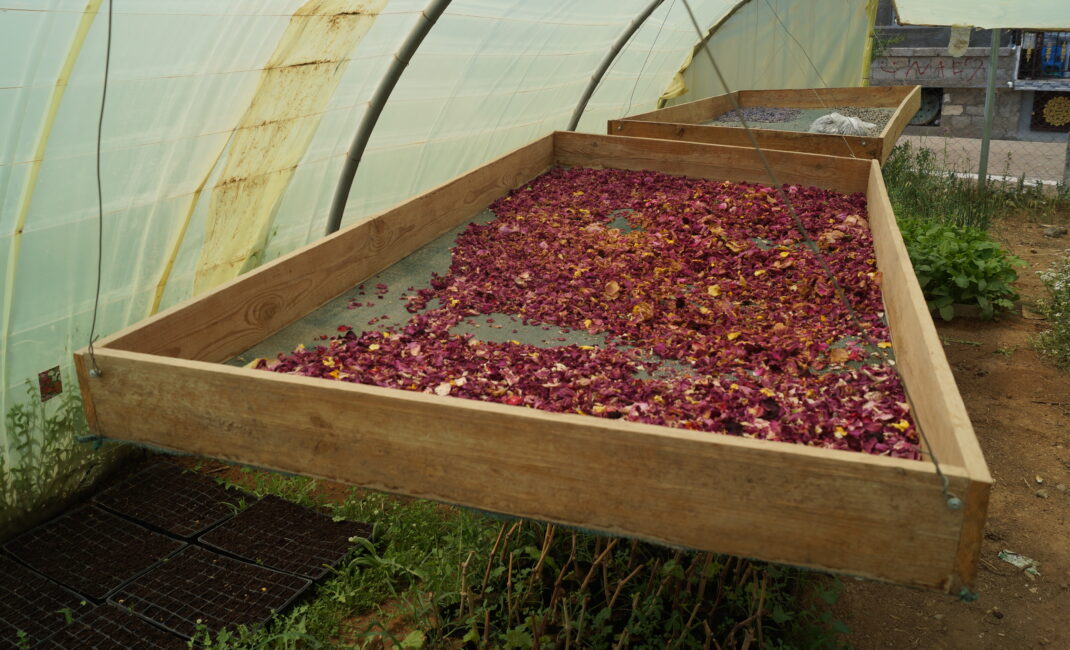
Aveen proved so capable at managing the garden that Mikey and the Lemon Tree Trust decided she was the right person to run it. She took on the responsibility while continuing to care for Sidra. Her daughter needed her attention more than ever, not just because of her worsening condition, but because Aveen’s husband had found a job.
In the summer of 2014, the Islamic State had burst out of Syria, capturing the city of Mosul, an hour’s drive south of Domiz. The Kurdish regional government mobilised the armed forces known as the Peshmerga, and with the Iraqi army in a headlong retreat, it was left to them to hold the line. Syrian refugees were not legally permitted to join the Peshmerga, but the situation was desperate. While an exact number does not exist, many refugees enlisted. Aveen’s husband was among them.
With the campaign against the Islamic State raging on the Nineveh Plain and east towards Tikrit, Aveen’s husband was away for weeks at a time. Aveen spent those weeks looking after Sidra and the two boys and helping the garden to grow.
A GROWING GARDEN… AND HOPES OF A PERMANENT HOME
The workload was shared by a rising number of camp residents, each of whom brought different talents. There was Castro with his thick red beard, who was responsible for the polytunnels that began to pop up around the garden. There was Shiyar, who spoke fluent Kurmanji, Arabic, and English, and could translate between all three. And there were others with abilities in horticulture, agriculture, and construction.
In plastic gutters, the team cultivated hydroponics. In a food garden, they grew fresh produce for the single mothers in the camp. Stray cats flocked to the horticultural garden, lying stretched out in the emerald shade. Around them, the warm wind blowing off the Nineveh Plain met the cool smell of mint, jasmine, and rose petals.
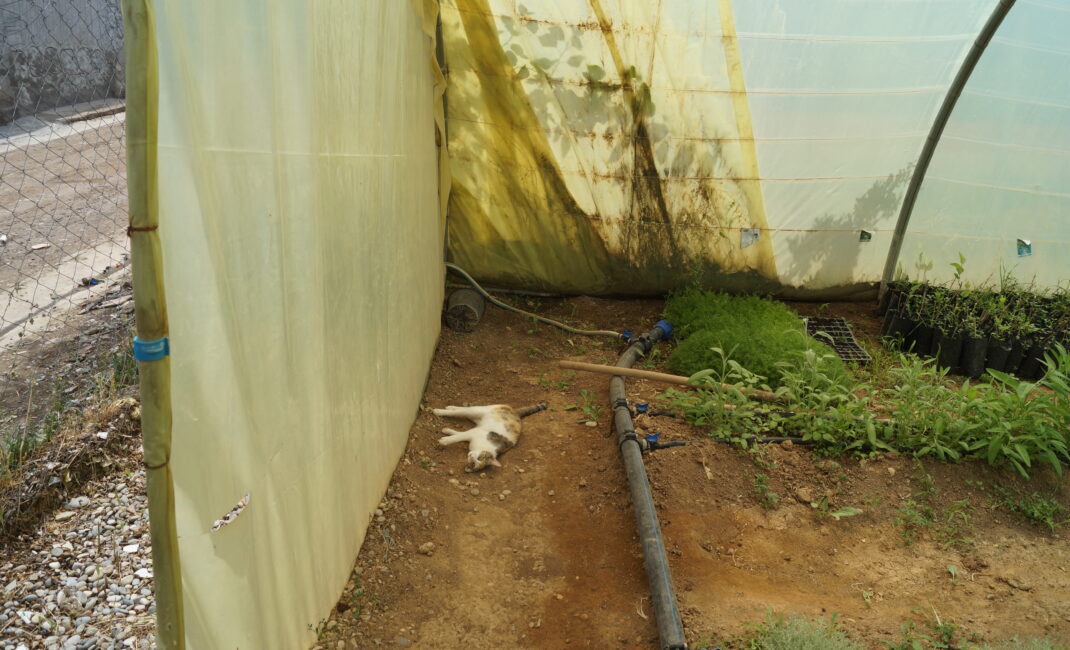
Throughout Domiz, a kind of permanence was being created. Increased quantities of hardcore meant that the knee-deep mud of early winters had subsided. Along these new streets, vibrant lanes of shops and restaurants were being established. They sold food, water, and basic necessities, as well as children’s toys, clothes, and more.
The sea of tents was giving way to concrete structures, featuring blue tiled walls and cement etched to give the impression of crazy paving. The camp residents were tired of waiting to find out what the future held for them and had decided to create a future for themselves.
Those with the space and money grew gardens and built extensions. This contributed to a blossoming sense of agency, but it also had material value. Domiz was developing an internal housing market, whereby residents could trade or sell houses among themselves. The belief among many residents, observers, and NGOs, was that the fences around Domiz would one day come down, and the camp would be integrated into the urban sprawl of Duhok.
Aveen and the Lemon Tree Trust were contributing to this feeling of permanence.
Through initiatives like garden competitions, camp residents were encouraged to show off their horticultural skills, invest in their surroundings, and strengthen their community.
In 2017, they began work on a women’s garden. While this period in Domiz was marked by growing freedom for its residents, this freedom was not shared equally between men and women. Kurdish society is often celebrated for its gender equality, and many women in Domiz had lived lives of relative autonomy in Syria.
Life in the camp, however, was not like life before. Although everybody lived within the confines of a fence topped with barbed wire, women suffered the greatest loss of freedom. As such, Aveen and her team wanted the women’s garden to be a place where women could grow vegetables for their families, but also be alone, together.
Just like Aveen’s indoor garden, the women’s garden started small. The team was worried that, ‘people would not accept it and the attendance would not be that much’. ‘At the beginning, it was like that, especially with the culture it’s not that common for women to just go out’. Azadî ‘liberation’ Garden consisted of just 25 raised beds, and even these filled up slowly.
One by one, however, the beds began to fill with cabbages, cucumbers, and lettuce, as a trickle of women took up the offer. As these women returned to their houses throughout the camp, arms laden with fresh vegetables, word began to spread. Eventually, Azadî Garden reached capacity, as women came to reap what they had sown, and the psychological benefits of sowing it.
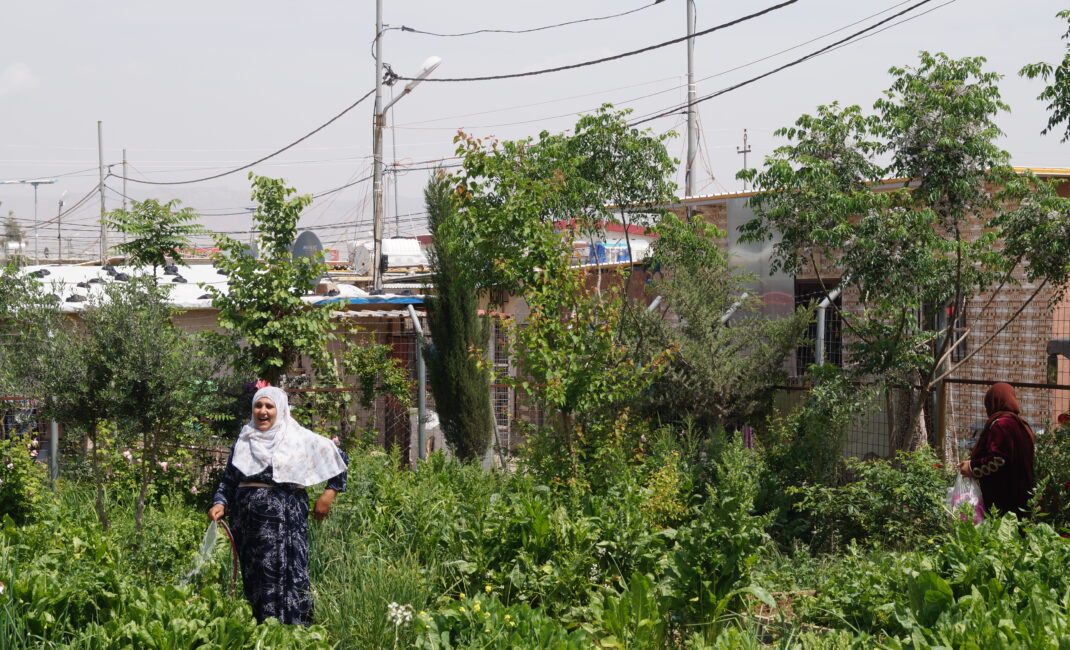
In response, Aveen’s team, ‘divided the raised beds again, to make 50’. Steadily, Azadî garden was becoming the social hub that they had imagined. Women laughed among the beds, while others weighed out produce on the communal scales. Bread could be bought in the camp, but those that wished to bake it themselves could do so in the garden. Aveen’s husband, whose back was slowly mending, called on his family vocation to build a heart-shaped fountain for them. At the top of the garden, a shelter was put up and painted pink and turquoise. Plastic garlands – the kind that Hawaiian dancers might wear – were draped along the walls, and tyres painted pink were stacked three high and filled with earth to grow flowers in.
FREEDOM IN THE AIR
Beyond the camp’s rusting security fence, freedom was also in the air. That year, 2017, the Iraqi Kurds voted for independence from Iraq by 92%. The fight against ISIS had seen the Peshmerga expand the de facto boundaries of Kurdistan to include mixed districts like Kirkuk and Sinjar. Once the battle to retake Mosul was over, Kurdish officials within the ruling party, the Kurdish Democratic Party (KDP), agreed to a deal with the rival Patriotic Union of Kurdistan (PUK), to hold a referendum in June 2017. In response, Iraqi special forces, supported by Iranian militia, drove the Peshmerga out of Sinjar, Kirkuk, and retook the Mosul Dam. Gunfire once again echoed on the Nineveh Plain south of Domiz.
Allegations that PUK forces had struck a secret deal to retreat reignited long-running tensions between the PUK and KDP. In the years to come, these tensions would begin to manifest within Domiz refugee camp.
Heartbreak for the Kurdish region was followed by personal heartbreak for Aveen and her family. With the Islamic State shattered by the winter of 2017, it became possible to cross the Syrian border for the first time in six years. Sidra’s condition was critical and she was unable to get proper medical treatment in Iraq, Aveen decided to take her to Syria, a difficult journey that many refugees made to set their affairs straight. She died there in 2018.
Aveen buried her daughter in their homeland, but Syria was no longer her home. ‘Everyone wishes to go back to their country’, but Aveen ‘had lost all connection’.
Beyond seeing little hope in a Syria still riven by ethno-sectarian conflict, she felt ‘connected and rooted in Domiz’. Returning to the camp, Aveen continued to dedicate herself to the gardens. While she cried for her daughter, she now had a sanctuary; a place where she could both lose herself and express herself to others.
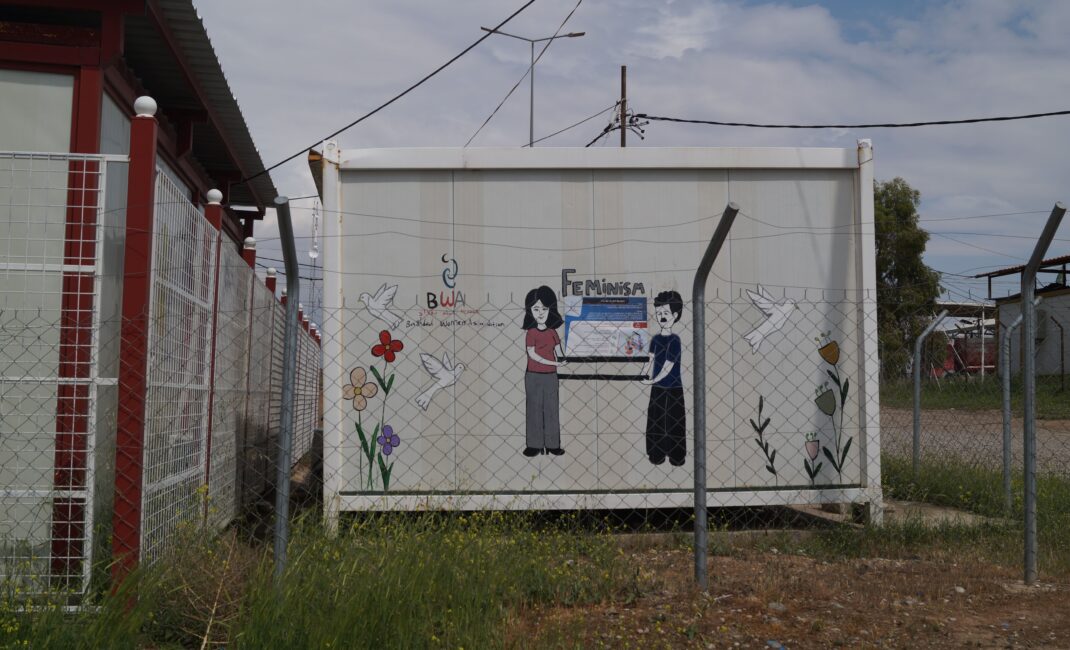
Aveen had grown up around animals, and she wanted the gardens to be a sanctuary for more than just people. When Aveen was a child, her father had kept birds, and she remembered a tortoise and a hedgehog that had lived among the flowers in their garden. For a time, the team experimented with keeping fish in big transparent tanks. In Azadî Garden, they raised rabbits and chickens Stray cats padded through the undergrowth of their adoptive home.
IRAQI KURDISH POLITICS AND ITS IMPACT ON THE CAMP
Almost a decade after arriving in Domiz with just her family, Aveen had been appointed operations manager, responsible for a team working across seven refugee camps in northern Kurdistan.
While the gardens were going from strength to strength, the tensions within the Kurdish regional government were beginning to make life harder for Syrian refugees.
In 2020, the UNHCR – which had managed Domiz since Aveen and her family had arrived – handed over responsibility to the Barzani Charity Foundation. The Foundation is named after Mustafa Barzani, the legendary freedom fighter whose statue is everywhere in Kurdistan. Barzani led the KDP in its armed struggle against the Iraqi state, until his death in 1979.
The foundation, which labels itself as a non-governmental, non-profit organisation, appears non-political. In reality, nothing is quite that simple in Kurdistan. Its founder, Masrour Barzani, is the current prime minister of the autonomous region. Masrour’s father is Masoud Barzani, leader of the KDP, and his grandfather was none other than Mustafa Barzani himself.
For the past three decades, Kurdish politics, split along familial lines, has been dominated by the Barzanis’ KDP and their rivals, the PUK, a political wing of the Talabani family. Critics have claimed the over-reliance of the political system on two families (Barzani and Talibani) has made Kurdish institutions fragile. And some have questioned whether the handover of refugee camps to a party-affiliated organisation risks importing factionalism into them.
Soon after The Barzani Foundation took over the running of the camp, there came a moratorium on selling houses.
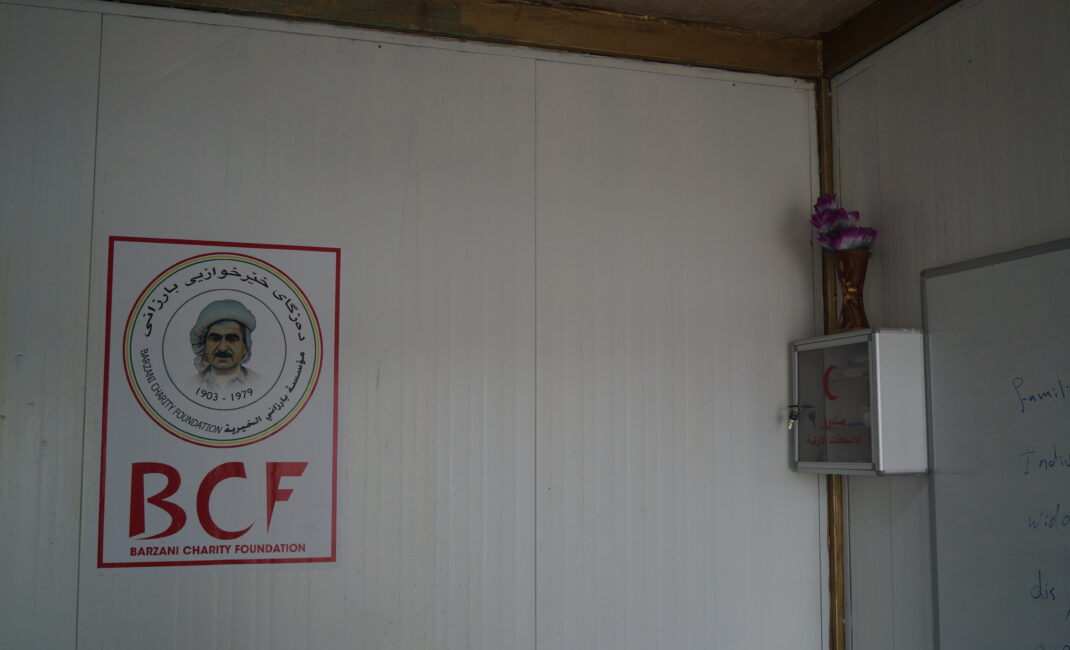
Since Domiz had transitioned from a tented encampment into a city of solid structures, the internal housing market had been integral to a growing sense of agency. While refugees could settle beyond the confines of the camp, they would lose their UNHCR-protected status.
Being able to relocate within Domiz not only created a sense of freedom, it had the potential to generate much-needed capital. Due to the vast numbers of Syrian refugees and the demand for shelter, a small concrete building with two bedrooms, a kitchen, and a small outdoor area could sell for as much as $7,000.
The moratorium on selling houses reintroduced a feeling of impermanence for many residents.
The camp perimeter was also being tightened. Under the UNHCR, there had been a general feeling that the fences around the camp would eventually come down. After the handover, a watchful eye was kept on the comings and goings. Security in the camp was handled by the Asayîsh; the Kurdish combined security forces.
When Mikey Tomkins of the Lemon Tree Trust returned to visit Aveen, Shiyar, Castro, and the gardens, he was told by the Domiz Asayîsh chief that he must stay within the gardens, not visit any of the houses, and leave when the charity’s staff finished work. These restrictions were unheard-of on previous visits. All in all, there was an ominous sense that the push toward integration was beginning to stall.
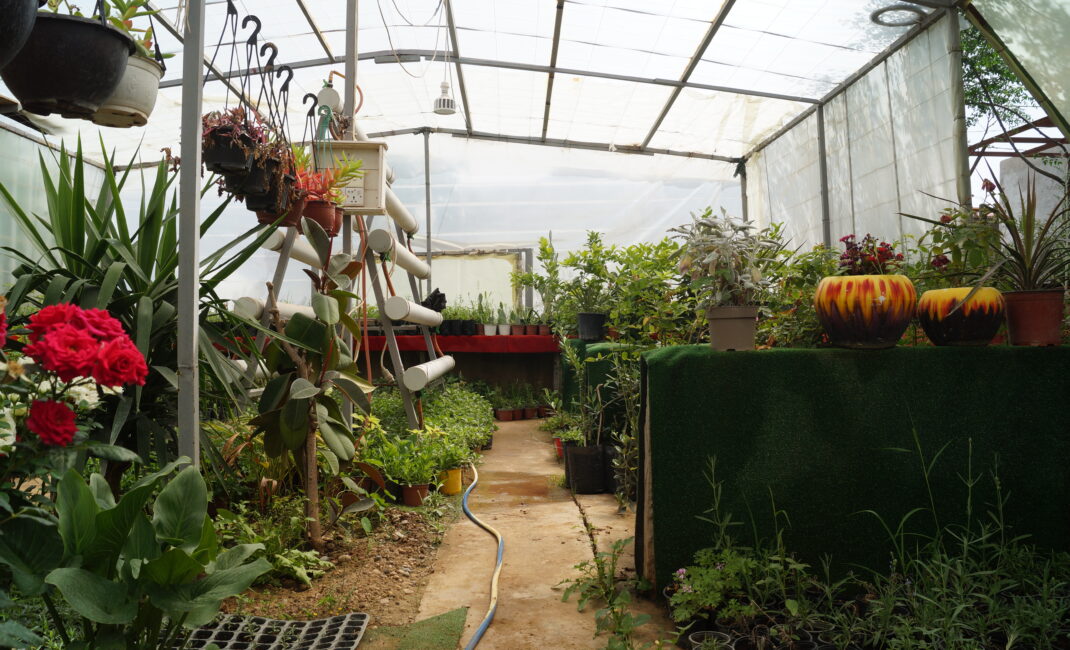
Life was not only getting harder for camp residents. Refugees who had settled beyond the security fence were beginning to feel that it was near impossible to find a secure Iraqi job.
Aveen was lucky enough to be employed by an international organisation, but for people like her fellow gardener, Shiyar who was no longer employed by the Lemon Tree Trust, the situation was getting bad. Shiyar had been closely involved in the project when the gardens were still germinal. Like Aveen, he had three children, and arrived when Domiz was a morass of mud and tents. Unlike Aveen, he had decided the camp was intolerable and found accommodation a half mile beyond the front gate. Fluent in three languages, Shiyar was highly employable. Life had been hard, but he had been able to work in and around Domiz. Then, at the dawn of 2022, the work dried up.
A decade in Iraq had made the country his home. Yet as a wet April simmered into May, he was getting desperate and considering a return to Syria.
Going back is dangerous for Syrian men. When the civil war started, all men of military age were drafted by the security forces. Those that refused the call, including those that fled the country, had an $8,000 bounty placed on their head.
As Shiyar had completed national service, his bounty was set lower, around $1,000. If he wanted to return to Syria, he would have to pay this off. If he did not, he would risk being kidnapped by a gang and ransomed to the regime.
His desperation was echoed by other Syrian refugees who wanted to work in Iraq. While a permissive legal framework exists for Syrians who want to work in the private sector, public sector jobs, which come with contracts and increased job security, are only available to citizens.
Among refugees looking for skilled work, there was a belief that the Asayish had become increasingly militant about enforcing this since the camp handover. Refugees would be told by a potential employer that there was no point in them attending an interview, as they would not pass an Asayish security check.
Like every institution of state in Iraqi Kurdistan, the Asayish are divided between KDP and PUK factions.
While refugees are not the intended target, they are often caught up in the internecine struggle between Kurdistan’s ruling families.
Throughout Sidra’s illness, Aveen found escape in gardening. When Sidra died, she was able to talk to her friends and colleagues about the pain. It was acceptable for her to grieve openly, and she was able to process the grief. Aveen’s husband was not able to do this. In Kurdish culture, men are expected to be the pillars of their household.
Aveen’s husband repressed his suffering, while also taking on a dangerous job. Heart conditions are often genetic, and after Sidra died, his heart began to suffer. In the Spring of 2022, he underwent life-saving surgery. In Iraq, such a procedure is extremely expensive, but it was made possible with funding from the Peshmerga. This kind of support strengthens the bond between Syrian refugees and the Peshmerga – and by extension, the KDP.
While the Asayish has been flexing its muscles, the PUK is simultaneously trying to engender some good feeling with the refugees. From her cluttered office within Azadi Garden, Aveen is now responsible for building relationships with other camps and organisations.
One of these organisations is the SEED Foundation, which builds gardens for women and children recovering from trauma. Registered as a non-political, non-government organisation, The SEED Foundation’s president is Sherri Kraham Talabany. Her husband is Qubad Talabani, the deputy prime minister of Kurdistan. His father is Jalal Talabani, who founded the PUK. Aveen and her team have worked closely with the SEED Foundation, helping them to establish a trauma centre in Domiz and Bersawa; a small camp for Kurdish and Yazidi refugees. In Bersawa, the team also renovated an existing play area. The garden now hosts workshops on gardening, helps people to form friendships, and acts as a safe place for women to socialise.
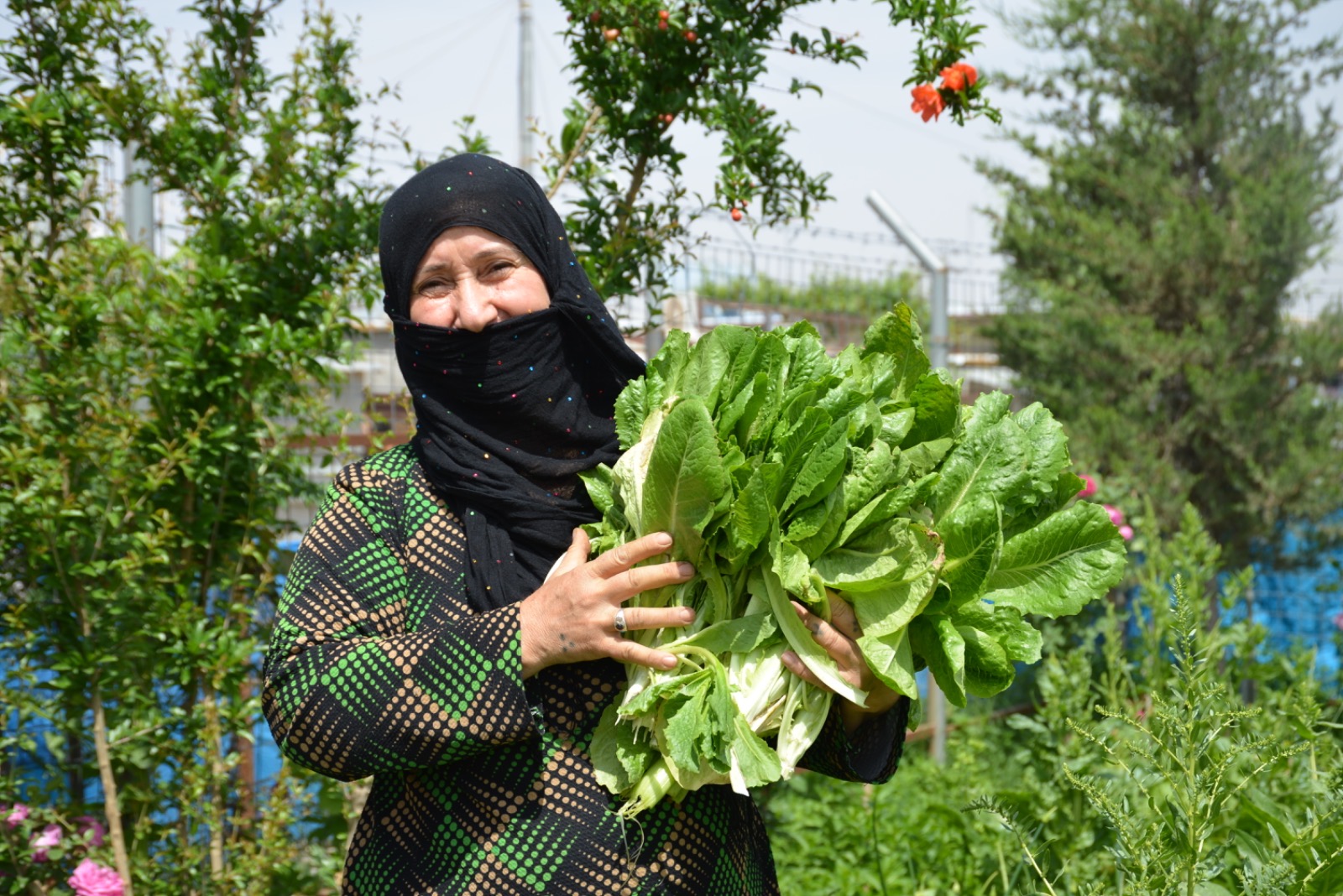
As operations manager, Aveen oversees similar projects in a further six camps. But with 260,000 refugees registered in Iraqi Kurdistan, there are limits to what her team and the Lemon Tree Trust can do. Whatever the political machinations, the cooperation of organisations like the SEED Foundation is a necessary success if more people are to have what Aveen calls, ‘the most basic right’; a place ‘that is green and comfortable to sit in’.
Last spring, ten damask roses were loaded into the back of a car outside Azadi Garden. Their roots protected by the thick clay of northern Kurdistan, they were driven south towards the Kurdish regional capital, Erbil. After a night in an air-conditioned hallway, the roses were taken to Baharka displacement camp, where 4,000 Iraqis have lived since ISIS drove them from their homes.
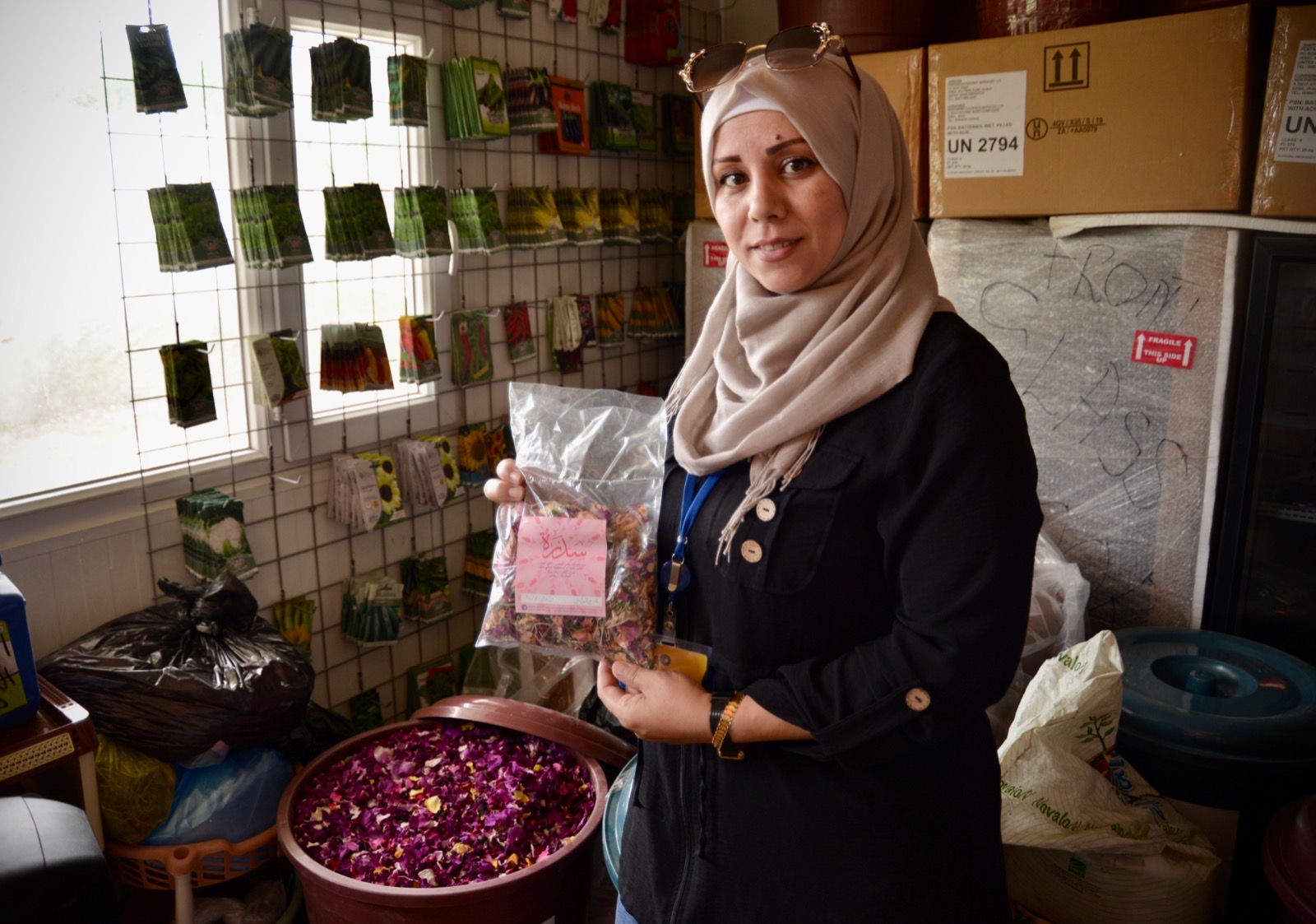
There, the roses were distributed among the residents. Aveen had personally experienced how a plant, given for you to grow, could begin to change your life. Ten roses would not transform Baharka overnight, but they would plant a seed of hope.
Read more:
